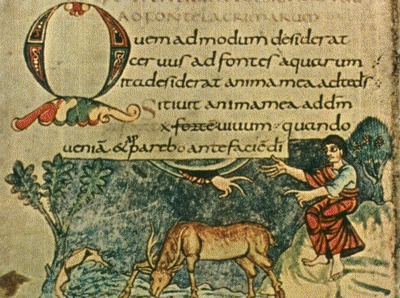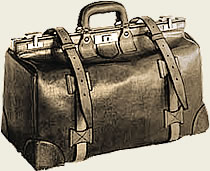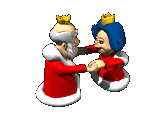
|
| ||||||||||||||||||||||||||||||||||||||||||||||||||||||||||||||
|
||||||||||||||||||||||||||||||||||||||||||||||||||||||||||||||
|
| ||||||||||||||||||||||||||||||||||||||||||||||||||||||||||||||

| ||||||||||||||||||||||||||||||||||||||||||||||||||||||||||||||
Look up portmanteau words in the portmanteau words
table now
|
About Portmanteau Words
A portmanteau is a traveling or carrying case large enough to carry a cloak, cape, or coat along with other pieces of clothing. That's a portmanteau case in the picture at the right.
The French word portmanteau is made up of two French words. In French, port means carry and manteau means coat. Literally, portmanteau means it carries the cloak.
The English word portmanteau is a loan word derived from the French word portmanteau; it means the same thing in both languages: a carrying case.
But in English, the word portmanteau also has a second and different meaning, one that refers to a type of word rather than to a suitcase. This other kind of portmanteau denotes a linguistic term, not a physical object. In its linguistic sense, a portmanteau "carries" parts of other words.
Let's look at this idea of "word carrying" more generally. In linguistics, a portmanteau is defined as a single morph that represents or suggests two or more morphemes.
What's a morpheme? A morpheme is a grammatical language unit such as a word (e.g., dog) or a word element (e.g., -s in the word dogs) that cannot be divided into smaller parts that are meaningful. A morpheme is the smallest unit of meaning in a language. For example, the grammatical units the, write, or the -ed in the word waited are morphemes because they each are meaningful and because each would loose all meaning if further divided. In, come, and -ing are three morphemes that make up the word incoming.
What's a morph? A morph is sequence of one or more phonemes (sounds) that represent a single morpheme. For example, the word infamous is spoken, read aloud or sounded out as the three morphs: 1) in-, 2) fam(e), and 3) -eous. The entire word preview is sounded out as the two morphs pre and view. The entire word sportsman is sounded out as the three morphs sport, -s, and man.
Said less theoretically, a portmanteau word is a blend of two or more morphemes and morphs in which morphemes selected from two or more other words are combined into a single word with a new and different sound and a new grammatical meaning all its own. The portmanteau word that's formed from these other words is a novel combination of the original sounds and meanings of the words it came from.
Examples of portmanteau words are smog, which is formed by blending the morphemes smoke and fog; and motel, which is formed by blending the morphemes motor and hotel. The single word smog suggests a smoky fog by associating parts of the two words it "carries," motor and hotel. The single word motel suggests a hotel for people traveling in motorized vehicles by associating parts of the two words it "carries," motor and hotel.
In linguistics, a portmanteau word (or simply a portmanteau) is a particular kind of word called a word blend. A word blend is any combination of parts of two or more full words that together make sense.
But portmanteau words are a special breed of word blend because they're formed by combining the blended words into a single new word in such a way that none of the original words fully appear in the portmanteau word.
A portmanteau word is a special kind of blend because: 1) it blends the separate meanings and sounds of multiple full words into one new and different full word with its own meaning and sound, 2) it does not contain any of the full words that it blends, but only parts of them, and 3) it often synergistically interrelates the phones and meanings of the full words that it blends in novel or unexpected ways.
In English, for example, as previously noted the word motel is a combination or blend of the separate words motor and hotel. The word motel does not sound exactly like either the word motor by itself or exactly like the word hotel by itself, but it sounds enough like each of them to associate one with the other when you hear or see it written. The association of motor with hotel suggests that a motel combines the two different full word meanings into a new full word with a new meaning. It signifies a hotel specializing in cars, trucks, and other motorized vehicles.
Brunch is a blend of breakfast and lunch. A brunch is neither a breakfast nor a lunch, but it sounds enough like the full word breakfast and enough like the full word lunch to associate their two distinct meanings. Thus it signifies a meal timed to occur somewhere in between, or a meal with a menu that offers food typical of both.
It's important to realize that a portmanteau word is a distinct word in and of itself, not just a pairing or conjoining of multiple full words. Thus we see that although all portmanteau words are word blends, not all word blends are portmanteau words.
For example, a blacklist is a list of persons under suspicion, disfavor, or censure. Blacklist combines or blends the full word black with the full word list; it links their meanings; it associates the sounds and meanings of each of these blended full words that it carries.
Blacklist is a word blend that combines (conjoins) two full words with separate meanings into a single new full word with its own meaning. But blacklist is not a portmanteau word because each of the conjoined full words it carries retains all of its unaltered phones and morphemes.
For the same reason, guesstimate, which is a combination of guess and estimate, also is not a portmanteau word because guess is a full word which appears in guesstimate with all of its original phones and morphemes intact. In general, the presence in a word blend of any of the full words that it carries disqualifies the blended word as a portmanteau word.
Ironically, although it's a word blend, the word portmanteau is not itself a portmanteau word because it's a blend of the two full words port (carry) and manteau (coat).
The French word for a portmanteau carrying case was given its new linguistic meaning in English by Lewis Carroll in his book Through the Looking-Glass published in 1871. He borrowed the word from French and applied his new meaning for it to the case at hand.
But portmanteau is not a true portmanteau word in its modern technical linguistic sense. If instead Carroll had coined the word porteau, perhaps he would have done his job more accurately. However, it seems obvious that the blend word portmanteau did its job for him far more stylishly than porteau would have done.
To give Carroll the full credit he amply deserves, in his book he did invent the two genuine portmanteau words, slithy, an adjective which conjoins slimy and lithe, and mimsy, an adjective which conjoins miserable and flimsy.
|
—note— dedication This feature is dedicated to the genius of Lewis Carroll. To see why, read on. |
Virtually all languages contain portmanteau words, but English contains an especially large number of them, with new ones being coined frequently and old ones passing away quickly: More
Watch out!
As noted above, a portmanteau word is a special kind of word blend, one that is a distinct new word in and of itself, not just a pairing or conjoining of two or more other words. It's a word that expresses a new idea, something synergistic that each of the words it blends do not express, either by themselves or together.
This distinction between portmanteau words and word blends deserves further examination.
Watch out! Portmanteau word blends and other kinds of word blends all contain parts of other words; since there are different ways to combine these other words words to produce different kinds of word blends, not all of them produce portmanteau words. It's easy to mistake non-portmanteau word blends for portmanteau word blends when they are really something else.
Unfortunately, the distinction between a true portmanteau word and another kind of word blend is not always easy to draw because all blend words are composed of text strings taken from the words that they combine; thus they all resemble the multiple words they're constructed from, one way or another. For example, the word tugboat is a simple conjoining of the two words tug and boat; it's not a portmanteau word because there's nothing conceptually or aurally different about the word. A tugboat is simply a boat that tugs, and the word tug functions as a descriptor of the word boat.
Compare the word tugboat with the word telegram. Telegram is a conjoining of the prefix combining form tele-, meaning transmission over a distance, and the suffix combining form -gram, meaning something written. Telegram does express a new idea the way a portmanteau word would, because it joins the notion of writing something with the notion of writing at a distance; it's really a portmanteau word because it conjoins a prefix with a suffix.
Now compare the word cablegram. A cablegram is a telegram sent by underwater cable; it combines the word cable with the text string tele in the word telegram. The word cable is represented in its entirety, and the word telegram is represented after truncation. Is there enough different about the word cablegram to justify it being judged a portmanteau word? The Muse Of Language Arts maintains that the answer is no.
On the other hand, The Muse maintains that the word Chinglish, which combines the words Chinese and English, is a portmanteau word. Chinglish refers to spoken or written English that is influenced by the Chinese language, a true portmanteau hodgepodge.
Why is Chinglish a portmantea word? Because it's a new word in the English language that designates a way of speaking that is neither the Chinese language nor the English language, while at the same time it suggests both. Further, when pronounced, the word Chinglish sounds like either of the two words that make it up, but only faintly.
For similar reasons, these additional words are also portmanteau blends: Britalian (from Italian), Czenglish (from Czech), Denglisch (German), Dunglish (Dutch), Franglais (French), Serblish (Serbian) Spanglish (Spanish), Swenglish (Swedish), Hunglish (Hungarian), Heblish (Hebrew), Engrish (Japanese), Hinglish (Hindi), Konglish (Korean), Singlish (in Singapore) and Tinglish (Thai).
Notice that English language portmanteau words like Denglisch and Franglais are compounded from other foreign words, words that aren't even taken from the English language. The den and lisch in Denglisch are taken from the German words for German and English; and the fran and glais in Franglais are taken from the French words for French and English.
Plenty of word lists containing portmanteau words can be found in books and at web sites. Unfortunately, many of these lists contain blend words that are not really portmanteau words, even though they're professed to be; blends that are not portmanteau words are scattered among those that are. To develop your ability to sort them out, you may want to consult one or more of these lists to see for yourself.
Hone your portmanteau detection skills now. Many lists of portmanteau words and ostensible portmanteau words are available over the Internet; here's one of them:
- Visit the website page titled Portmanteau Words at the web site called Welcome To Scorpio Tales: click here.
about the table of portmanteau words
The Muse Of Language Arts is pleased to offer you a searchable and sortable table containing Portmanteau Words.
- See The Muse's table of portmanteau words. Visit The Muse's table of Portmanteau Words: click here.
Publish your own portmanteau word in the portmanteau words table and at the portmanteau word of the day feature
Electricka invites you to submit your own Portmanteau Word for publication in the Portmanteau Words Table.
Since portmanteau words published in the Portmanteau Table also appear in the feature called Portmanteau Word Of The Day, when you publish your portmanteau word in the Table also expect to see it in the feature called Portmanteau Of The Day, cited above.
- To find out more or to submit your portmanteau word, consult Electricka's page called Guidelines For Arts Information Contributors—Portmanteau Words Table: click here.
To encourage you to send write and submit your own original arts tidbit, The Muse has declared Arts Tidbit Of The Day an Arts Information feature.
- For more information about this and other Arts Information Features, visit the Arts Information page at this web site: click here.
about the portmanteau word of the day
Each day The Muse Of Language Arts publishes a portmanteau word at the page called Portmanteau Word Of The Day.
- See today's portmanteau word: click here.
Happy "Word Carrying!"
more about words
The Muse Of Language Arts sincerely hopes that you have profited from and enjoyed this list of portmanteau words.
If your experience with Portmanteau Words leads you to the conclusion that words are interesting, amusing, edifying or informative, you ain't seen nuttin' yet. Continue your exploration of words by visiting one of the pages listed in the right margin of this page.
Electricka's reference shelf
Want to look up the meanings of words online? Electricka's Reference Shelf contains or provides access to numerous dictionaries, encyclopedias, and other reference works that contain all sorts of information about words, among them an etymology dictionary, conventional dictionaries, encyclopedias, and thesauri. These references are the result of a collaboration between Electricka and The Muse Of Language Arts, so you know they have to be good.
- Visit Electricka's Reference Shelf: click here.
ETAF Recommends
Sources that address the subject of portmanteau words are few. Here are some that are members of the ETAF-Amazon Collection.
...Coming.
|
|
Search this web site with Electricka's Search Tool:
tap or click here
Electricka's Theme Products
Shop At Cafe Press
This web site and
its contents are copyrighted by
Decision Consulting Incorporated (DCI).
All rights reserved.
Contact Us
Print This Page
Add
This Page To Your Favorites (type <Ctrl> D)


You may reproduce this page for your personal
use or for non-commercial distribution. All copies must include this
copyright statement.
—Additional
copyright and trademark notices—
| Exploring the Arts Foundation |
 |
| Today's Special Feature |
| Search Now |
| To Do |
| To Do More |
| Arts Information |
| Related Pages |
| Our Blogs |
| Our Forums | ||
|
|
Resource Shelf |
| ETAF-Amazon |
|
|

 about
Portmanteau Words and the portmanteau words table
about
Portmanteau Words and the portmanteau words table